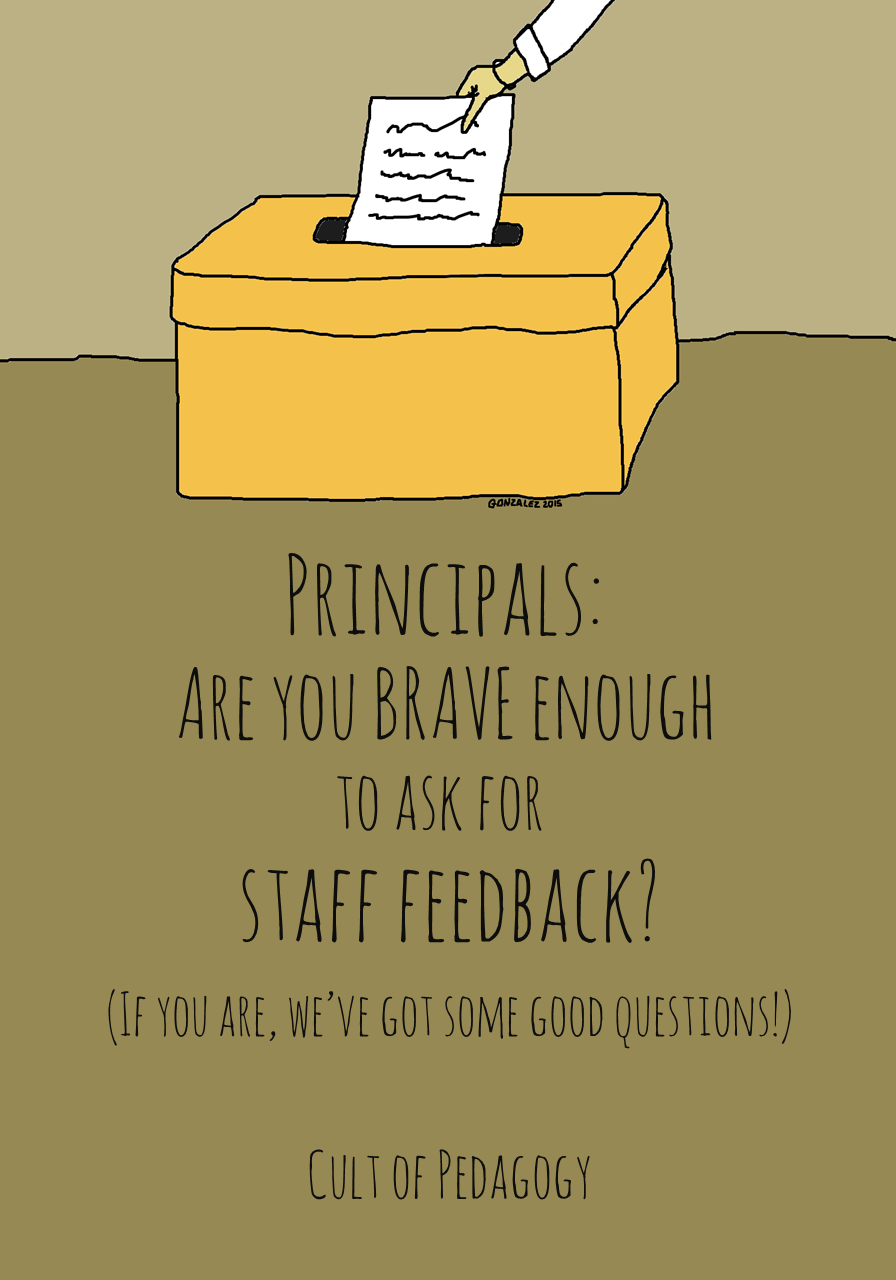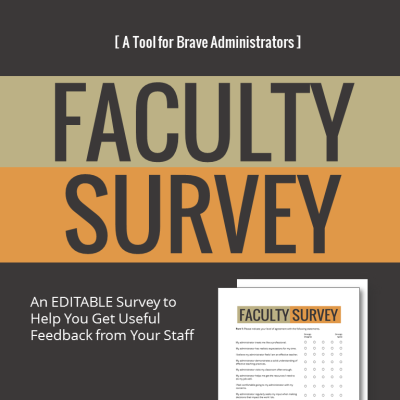
“Criticism may not be agreeable, but it is necessary. It fulfils the same function as pain in the human body. It calls attention to an unhealthy state of things. If it is heeded in time, danger may be averted; if it is suppressed, a fatal distemper may develop.”
~ Winston Churchill
No one likes criticism. It’s in our nature as humans to avoid it, sometimes at all costs. Still, hearing what you need to work on is one of the only ways you get better. And if you’ve taken on the incredibly complex and demanding job of school administrator, you probably have plenty to work on. Your staff is one of the most valuable sources of information you have about your school culture, whether students are getting what they need, staff morale, and how effectively you’re doing your job.
The question is, are you taking advantage of this resource? Are you asking for feedback from your staff? If you are, if you’re asking quality questions and seeking honest answers, then you’ve probably grown quite a bit as a result, and your staff is probably grateful for the opportunity to express themselves.
If not, then maybe it’s time to start. Maybe this is the year you take a deep breath and ask.
Getting Quality Feedback…for Real
It’s possible that you think you’ve been asking for feedback, but you have been doing it in a way that isn’t producing results. Maybe you occasionally mention something general to your staff like, “Hey, if anyone ever has suggestions or feedback for me, just let me know.” Or in your start-of-the-year speech to the faculty, you mention that you have an open-door policy — teachers should feel free to talk to you any time they’re having a problem.
Only two types of employees will take you up on this offer: Those who have a close relationship with you, and those who are very, very bold. In our 2014 survey of teachers’ attitudes toward their administrators, a full 70 percent said they would not feel comfortable going to their principals with a concern about something the administrator had done. This doesn’t mean problems don’t exist; it just means very few people are willing to tell you about them.
To get genuine, honest feedback, ask for it in a way that protects the respondents’ anonymity, allowing them to speak their minds freely without fear of repercussion. You can do this by simply telling teachers to leave their names off their responses, or distribute the survey through a free online survey platform like Google Forms, SurveyMonkey, or Typeform.
This doesn’t mean you should open yourself up for harsh, snarky, non-constructive criticism: Before launching any kind of survey, tell your staff that you are seeking feedback so you can improve, and request that they stick to comments that are professional and constructive.
You also need to ask good questions.
Suggested Items for a Faculty or Staff Survey
To get a full, clear picture of how well you’re doing, ask questions that prompt teachers to consider your performance from different, specific angles, while allowing them to also provide more open-ended feedback. The following are some suggested survey items.
This first set is a list of positive descriptors. Have respondents indicate the extent to which they agree or disagree with statements like these:
- My administrator treats me like a professional.
- My administrator has realistic expectations for my time.
- I believe my administrator feels I am an effective teacher.
- My administrator demonstrates a solid understanding of effective teaching practices.
- My administrator visits my classroom often enough.
- My administrator helps me get the resources I need to do my job well.
- I feel comfortable going to my administrator with my concerns.
- My administrator regularly seeks my input when making decisions that impact the work I do.
- My administrator supports my decisions about student behavior.
- My administrator supports me when conflicts arise with parents.
- My administrator cultivates a positive relationship among faculty members at this school.
- I feel empowered to make decisions about my teaching.
- I enjoy coming to work most days.
- I feel we have a positive school culture.
- In general, I believe our school is meeting the needs of our students.
It’s also a good idea to include some open-ended questions to help root out problems that can’t be detected by the statements above. Here are a few good open-ended items:
- I feel my administrator is strong in these areas:
- I would like to see my administrator grow in these ways:
- I believe our school is working well in these areas:
- I would like to see our school change in these ways:
Finally, leave room for other comments or suggestions that don’t necessarily fit into any one category.
What to Do with Your Results
Once the feedback comes in, you’ll need to brace yourself for reading things you don’t like. For some people, even getting an “agree” when they could have gotten a “strongly agree” is enough to hurt.
Push through it. You can handle this. Whether a person’s feedback is fair or not, grounded in reality or not, it’s true for them and therefore has some impact on your school.
With an anonymous survey, you obviously won’t know who said what. This makes follow-up tricky. Avoid trying to hunt down people who made specific comments: This will destroy the trust you built in the first place by establishing anonymity. Instead, look for patterns. If more than one person marked you down for something, it’s worth taking a good look at your practices in this area. Share your results with someone who knows you well and whom you trust — this could be a spouse or partner, another administrator, or even a teacher whose opinion you respect — and ask them to give you some honest feedback based on your results.
If you choose to share your results with your staff, do so carefully — be sure to remove anything that might put a spotlight on anyone, such as a comment that’s obviously from one particular teacher. Keep the focus on you and how you can better serve your staff.
Then, make a plan. Set some goals for improvement in the areas where you need the most growth, and after some time has passed, ask for input again.
Getting feedback is rarely pain-free. Neither is growth. But the rewards you’ll reap from going through the process — happier teachers who stick around, a school that truly meets the needs of students, and the priceless knowledge that you’re doing a good job — are worth it. ♦
I have a great one in my Teachers Pay Teachers store. It’s a fully editable Microsoft Word file that’s ready to print and use as is (containing the questions in this post), or you can add questions of your own. Click here to take a look.
Join my mailing list and get weekly tips, tools, and inspiration — in quick, bite-sized packages — all geared toward making your teaching more effective and joyful. To thank you, I’ll send you a free copy of my new e-booklet, 20 Ways to Cut Your Grading Time in Half. I look forward to getting to know you better!






Hi Jennifer! I took your challenge! I am an elementary school vice principal and after reading your blog, I reflected on the fact that I’ve done 15 different staff appraisals this year, yet they never really get an opportunity to provide feedback to me. It was an amazing experience! I’ve just recently become a connected leader, with Twitter, Blogs and Chats so I’m going to use this experience to write my first blog. The professional push I’ve had from educators through social media has already made me a more reflective leader so thank you for contributing to my growth!
Cynthia,
You have no idea how excited I am to hear this! I’m so glad you decided to take that brave step, and I bet your staff is, too. Thanks so much for sharing this!
Jennifer — I would love to see a regularly occurring evaluation where people did sign their names. We sign our names to student assessments. Principals sign their names to teacher assessments. For me, the days of anonymous evaluations after people have pent-up frustrations should be over. Rather, we could seek feedback often. After staff meetings: 1) what went particularly well? 2) what is one suggestion for improving the next meeting? At a teacher/principal meeting: How have I helped you help your students succeed? What else could I do to support your work?
And so on. There are so many ways to build relationship and trust and provide feedback you can own. It changes the culture of the school.
There are schools where the principal uses the principal evaluations to attack the staff if they aren’t all positive and can specifically attack certain staff if it’s not anonymous. Please remember that even in 2016 there are bully principals still in power.
Too true and I hope I’m not one of them! I think this sort of thing could work where trust has really been established and ‘proven’ but too often the turnover of administrators and staff is too high for these relationships to be properly formed. The most important things for me is to let teachers know that their feedback has been heard and that you have reflected and taken note. The idea of ‘servant leadership’ really underpins this philosophy and need for a two way openness on both sides.
Evaluations such as these are no good when the teachers are ditzy… And in 40 years of administration I find most teacher school climate evaluations are based on teacher perceptions and not school reality… Teachers just do not see the big picture. Their big picture is Me…. Me…. Me
Ditsy?? Me Me? Really? I really wonder what your turnover rate is with these type of demeaning comments. You must really get off on your power trip. I would not work for you.
Wow, I bet you are a great leader!
Jennifer, I like these ideas, as well as the concise nature of the questions. I feel they really convey important areas for teachers, as opposed to areas that might be highlighted as important to administrators for Board, District or State – though they are not necessarily exclusive. I am a secondary school principal and just attempted my first survey after 4 years of procrastinating cowardice! It is ‘true for them’ as you say, and, though not all my feedback was pleasing, it was at least useful in the sense that the oranges and reds on the pie chart can become areas of focus. Fortunately, I didn’t get a mauling so feel more inclined to give it another go! On reflection, I should have used some of the survey questions you shared and binned some of my own. Keep writing and creating!
I am a high school principal and just sent out your survey to my teachers. One of my teachers responded immediately saying how wonderful she thought the survey was and did I know of any for teachers to use with their students. She acknowledged the fact that she could simply modify the one I had sent, but was just curious if I knew of one that already existed for teachers. So, now I am passing that question on to you. Do you happen to know of a similar survey for teachers to use with their students?
Thank you. I can’t wait to get the results for myself.
Hey Abby!
This is Debbie, a Customer Experience Manager with Cult of Pedagogy. Thanks for writing in and — and Yes! On our site teachers can check out 5 Reasons You Should Seek Your OWN Student Feedback. There they can read about the benefits of getting student feedback, learn how to create a great survey, and they can even access a ready-made form to use for gathering student feedback. Have fun!
Thanks Abby, and thanks Debbie for the answer! I will take a look as soon as I finish with my grades & comments! I was just wondering this last week that I should update my old survey I’ve been using for a while now with my students …
I know as well that I will enjoy going through Cult of Pedagogy this summer.
Hi Jennifer,
I stumbled across these questions a while back and never saved the bookmark. I am so glad I have found them again. I have converted into a Google Form. Hope this is not a problem. This style of questioning encourages conversation and helps to address issues without the conflicts. Really appreciated and very empathetic to the needs of principals and their teams.
Megel,
Would it be possible to share your google form with the survey. I would like to give it to my teachers as well
Hello, Jennifer! It is the great challenge to collect the feedback from staff. But it is also necessary to know the point of view of staff. Thanks for sharing and keep posting such nice blogs.
Jennifer,
I enjoyed reading your post. My wife is an educator and suggested that I look into your site. I am a high principal and am always looking for ways to improve school culture and connect with my students and staff. I got some good ideas from your post and plan on creating a survey to use in the near future. Thanks for the information.
After many years as an AP, I am now in a new district as a high school principal. I did a powerful activity with my staff on our inservice day last Friday. I placed large post it notes around the room with prompts such as “If I could tell the district office one thing or would be”, “”Mrs. Ehrheart, “I am most stressed about” “If could change one thing about our daily PLC’s it would be..”. and so on.
I explained that after a month together I could sense the stress in the school and I wanted to gather the information to do three things: make changes I could, share information with the district office and provide additional support and training as needed.
I left the small groups for 15 minutes with post it notes and pens to respond to any prompts they wanted. When I came back I read the answers and invited everyone to do the same. I sat at the conference room table with the teachers and went around the room. I asked each teacher to share what was the most important thing I needed to take away from this activity. The sense of relief in my staffs faces paired with the thank yous was unexpected. I am now moving forward with my end of the deal.
I love that you did this exercise. I bet this was the first time many of those teachers were ever invited to share their thoughts like this. I hope others read your story and follow your example. We need more leaders like you. Thank you.
I used an anonymous how can we help document when I noticed the morale was low near the beginning of the year. I asked questions like: What is going well? What materials have you been given that you don’t understand? What acronyms have you heard that you don’t know or don’t understand? What is your number one frustration? What would help with that frustration? What one thing would make your life easier? What would help ease stress and increase morale? Some of the changes made were: I was able to change when lesson plans were due and still give our administrative team time to review. We were also able to create an acronym sheet to help. We also were able to ease up on our number of emails because some people were getting overwhelmed. I think once the staff saw we were really listening and willing to make changes, they opened up more on a personal basis. You have to read these surveys with an open heart and be willing to look at it through the teachers’ eyes. Once an administrator loses sight of what it is like in the classroom, and is unwilling to bend, it’s time to do something else.
In our building the Union asks two questions. What is going well? What is not going well. All responses are anonymous and written due to possible repercussions. All responses are typed. Building Union Representatives present the questions and responses to the building principal. Some comments shared in this format are far more honest than surveys, exit tickets, and open door policy. Here is an example: There has been voices raised and put downs at teachers from leadership and it makes me feel uncomfortable to the point I do not want to be a teacher at this building. It is very uncomfortable to the principals that have no clue of what is going wrong. A principals response was: Well, why didn’t they come and ask me? I have an open door policy.
Thank you for posting excellent topics.
Hi Mario,
Sharing feedback or concerns with a principal can feel vulnerable and intimidating, yet it’s so important to have that communication in order to create a school climate that is supportive of staff and students. Your comments reminded me of another great post to read if you haven’t already. What Teachers Want You To Know: A Note to School Administrators.
Effective feedback should lead to meaningful reflection by the principal. It should also be looped back to the staff. I would suggest adding, “My administrator communicates effectively.” As a former principal, I was guilty of poor communication many times. As a teacher, I find myself desperately wanting clear communication from my principal.
WOW just what I was searching for. Came here by searching for school administration
Thank you for putting into words the exact reason why I have not done a staff survey. It is a very vulnerable position to put yourself in, especially when you feel like you are on an island unto yourself with little to know support. Still it is important to get the feedback and in order to be better, I have to know what needs to be better. So I’m going to dive in and do it. Eek!
Thank you for sharing this post with educators. I have been doing surveys with students (when I was in the classroom) and with staff (since moving into administration) for 25+ years. Mine have always been name optional. Students and staff welcome the opportunity to share their thoughts and are very appreciative that I am willing to open myself up to suggestions. This practice also models for staff what I hope they are doing in their classrooms – getting feedback from their students. If you are brave enough to put yourself out there and are genuinely willing to make changes to your practice when needed, this is a win-win all around.
Thanks for sharing this, Jeff!
I wonder how administrators might adapt these questions for pandemic teaching? Our district is launching fully remote/ distance learning on Monday. I know teachers are experiencing deep struggles, uncertainty, fear, etc. I want to support teachers’ humanity and wellness. What feedback might be most important for administrators to seek in this moment?
Hi! I think several of the items in the article are still applicable to today’s current situation, especially the issue of time. If you haven’t already seen Jenn’s Facebook post that she did live, it’s a good one to check out. Also, I’d just ask teachers what they need (other than for this thing to go away). Then think about what could be put in place to help them feel more confident and less overwhelmed. Teaching is hard enough under regular circumstances and now it’s even harder. Teachers want to get this right, but they’re in uncharted territory, so it’s important they be given grace, time, and empathy. Take a look at this article – there are some really good suggestions to help teachers get the year started. Any teachers out there who can jump in on this one? Thanks.
Hello! This is a WONDERFUL article! I wish I could send it a long to my administration. I am a teacher who is working on gathering information about current staff morale. Do you have a survey for teacher-to-teacher morale?
Hi Jess, are you looking for a teacher survey about admin or something more general? If you could say a little bit more about what you’re looking for, maybe we have something we can recommend.